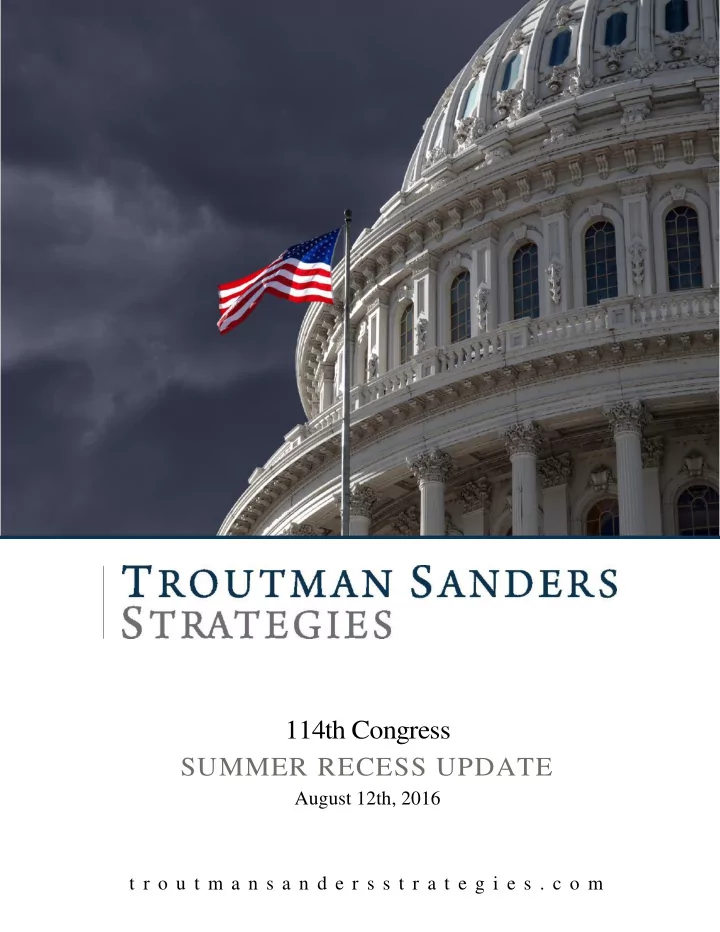

114th Congress SUMMER RECESS UPDATE August 12th, 2016 t r o u t m a n s a n d e r s s t r a t e g i e s . c o m
Table of Contents Congress in Recess ..................................................................................................... 2 Government Funding .............................................................................................. 2 NDAA ..................................................................................................................... 3 Energy Policy ......................................................................................................... 3 21 st Century Cures .................................................................................................. 4 Trans-Pacific Partnership ....................................................................................... 4 5 Supreme Court Nomination .................................................................................... 5 Zika Funding ........................................................................................................... 6 Higher Education Policy ......................................................................................... 6 Financial Regulations Overhaul ............................................................................. Recent Congressional Accomplishments ................................................................... 7 Opioid Abuse .......................................................................................................... 7 Puerto Rico ............................................................................................................. 7 Toxic Substance Control Act .................................................................................. 7 FAA Reauthorization .............................................................................................. 7 Genetically Modified Foods ................................................................................... 7 8 National Conventions ................................................................................................. 8 Republican National Convention ........................................................................... 8 Democratic National Convention ........................................................................... 9 Elections: 2016 ........................................................................................................... House of Representatives: Summary...................................................................... 9 Senate: Summary ..................................................................................................10 Senate: 2016 Races ...............................................................................................11 2016 Congressional Calendar ..................................................................................12 Troutman Sanders Strategies LLC ...........................................................................13 1
Congress in Recess The U.S. Senate and House of Representatives left Washington, D.C. on July 14 to embark on a seven week recess. Many Representatives and Senators took on leadership roles at the national conventions, acted as delegates, or appeared as speakers. Most, however, returned to work in their home states and districts and to campaign for their own elections in November. Both chambers are scheduled to return to legislative business on September 6. When Congress returns to the Capitol, they only have about 9 weeks left in the year scheduled for legislative business. Despite this short window, there are many agenda items remaining. Below are a few items Congress left unfinished and may address in September, the lame-duck session after November 8, or into the 115 th Congress. Government Funding When Congress returns from recess, lawmakers will have less than four weeks to implement federal spending legislation if they want to avoid a government shutdown. The federal government’s f iscal year ends on September 30. The House and Senate Appropriations Committees have marked-up and passed out of committee all of the 12 annual funding bills, but only three have passed the full Senate and only five have passed in the House. Only one bill, the Military Construction & Veterans Affairs bill, passed in both chambers, but was later blocked by Senate Democrats over Zika-funding language conference report. Election year politics all but ensures that this gridlock will continue when Congress returns. Democrats in both the House and Senate will adamantly oppose funding measures that contain conservative policy provisions considered a priority for many Republicans. Given this deadlock, a continuing resolution (CR) will likely be needed to keep the federal government operating while leaders work on a broader funding agreement. The question now remains; how long will a CR last? 2
One option Congress may consider is a short term CR that keeps the government funded until just beyond the November elections. This would tee up lawmakers to return to the Capitol during the lame-duck session to continue working on FY 2017 appropriations legislation or craft an omnibus spending package before the December holidays, similar to what happened in December 2015. Lawmakers on both sides of the aisle have expressed a desire to finish FY 2017 work before a new Congress and a new administration takes over in January 2017. Bills that have passed the appropriations committees could be used as vehicles to craft an omnibus package. Some House Freedom Caucus members are advocating for a six-month CR, which would kick the can down the road to sometime in March 2017. While some Senate Republicans indicated their support for the measure in July, House Speaker Paul Ryan (R-WI) and Senate Majority Leader Mitch McConnell (R-KY) have yet to commit to such a plan. If Congress passes a six- month CR before knowing the results of the November elections, Republicans risk losing leverage in spending negotiations if they lose the White House, the Senate, or both. However, many members of the House Freedom Caucus and the Republican Study Committee are opposed to working on appropriations during the lame-duck, fearing leadership will concede too much to the Democrats. A third option, although unlikely, would be for Congress to pass a full-year CR using previous funding levels. This option would anger appropriators who have already worked hard to write and mark-up FY 2017 spending bills. Omnibus spending packages are preferable to a full-year CR for many lawmakers and federal agencies because the former still allows for policy changes and funding adjustments for federal programs. NDAA The House and Senate voted in July to go to conference on the National Defense Authorization Act (NDAA), the annual defense authorization bill that Congress has passed consecutively for 54 years. The conferees will face difficulties; there are a number of controversial policy differences between the two versions, some that even face a presidential veto threat. Given the normally bipartisan support the NDAA has historically received, the defense authorization legislation will likely be a top priority for lawmakers when the return to legislative business. On the House side, Armed Services Chairman Mac Thornberry (R-TX) and Ranking Member Adam Smith (D-WA) will likely lead the negotiations. Although the Senate has not formally announced conferees, Armed Services Chairman John McCain (R-AZ) and Ranking Member Jack Reed (D-RI) will undoubtedly play large roles in forming an agreement. Energy Policy After years of committee work crafting comprehensive energy legislation, both chambers have finally agreed to conference and reconcile the differences between the House’s North American Energy Security and Infrastructure Act (H.R. 8), sponsored by Fred Upton (R-MI) , and Senate’s Energy Policy Modernization Act (S. 2012), sponsored by Lisa Murkowski (R-AK). Senate and House conferees and their staff members will be working during the summer recess to hammer 3
Recommend
More recommend